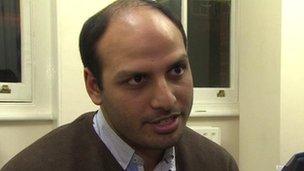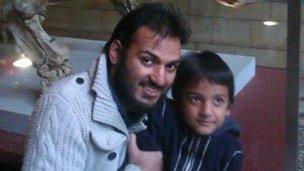Abbas Khan: Doctor's death in Syria 'in effect murder'
- Published
Hugh Robertson MP: "Syrian authorities have in effect murdered a British national who was in their country to help people"
British doctor Abbas Khan has been "in effect murdered" by the Syrian authorities just days before his expected release from jail, Foreign Office Minister Hugh Robertson said.
He said the death of the 32-year-old orthopaedic surgeon from south London was "at best extremely suspicious".
Mr Khan was arrested last year in Aleppo where he was helping civilians.
Syria's Deputy Foreign Minister Faisal Mekdad said Mr Khan committed suicide using his pyjamas to hang himself.
He said the results of an autopsy proved this, and Mr Khan's body would be released to his family so they could conduct their own inquiry.
One of Mr Khan's brothers, Shahnawaz Khan, said it was "a lie" and "pure fiction" that his brother committed suicide as he had written to his family saying he was looking forward to coming home and spending Christmas with them.
'No excuse'
The doctor's relatives had been told he would be freed on Friday following an order from Syrian President Bashar al-Assad.
Mr Robertson said the government was seeking "urgent clarification" about what had happened to Mr Khan, originally from Streatham.
Mr Khan travelled to the city of Aleppo last year to help civilians, as Lyse Doucet reports
He said: "We can't at the moment be absolutely certain about the circumstances in which Dr Khan met his death, but what is clear is that he went to Syria on a humanitarian mission, was imprisoned by the Syrian authorities and met his death while he was in prison in circumstances that are at best extremely suspicious.
"There is no excuse whatsoever for the treatment that he has suffered by the Syrian authorities who have in effect murdered a British national who was in their country to help people who were injured during their civil war."
'Summarily executed'
Respect MP George Galloway, who has liaised with the Syrian authorities and was due to collect Mr Khan on Friday, said the death was "murder most foul" and it was "inconceivable that he committed suicide".
The MP for Bradford West said he believed somebody within the regime had killed Mr Khan to defy President Assad's decision to release him.
The former British Foreign Office minister, Alistair Burt, who handled Mr Khan's case up until two months ago, said he does not believe the Syrian government's version.
He said: "The chances of this poor man killing himself when there was a possibility of release seems very remote.
"Had he thought there was a chance of release and return to the United Kingdom, he would most certainly have wanted to do so. In some way he has been killed by the Syrian authorities and they bear the entire responsibility for his death."
BBC correspondent Paul Wood, reporting from Beirut, said Mr Khan could have been a casualty of a power struggle between the Syrian president and his own security services.
He said: "Only President Assad could have ordered the doctor's release. If he did so it may well have been a goodwill gesture in the run up to peace talks that Britain is helping to organise.
"Some in the regime perhaps do not want those talks to succeed."
Shahnawaz Khan said his mother was in a "state of shock and disbelief".
"She was readying herself to bring her son home in four days time after 13 months of a rollercoaster of emotions," he said.
"To be so close and then to be robbed of it is almost the cruellest way it could possibly happen."

Shahnawaz Khan said his brother was summarily executed
He rejected the Syrian government's claim of suicide, saying it was a "complete fiction" and "utter nonsense and I would ardently deny anything of that scenario".
"We have letters from [my brother] from last week, looking forward to coming home for Christmas, spending Christmas together and starting the new year fresh, he's been in the best spirits he's been in in the last 13 months and he is not a man to give in like that."
Extracts of a letter dated 4 December, shown to the BBC, which appear to be from Mr Khan to his six year old daughter Ruqquaya, reads: "To Ruqqa, thank you for your lovely drawing of everyone.
"Inshallah I will soon come home and give you a big hug and kiss."
He also wrote: "I think the decision to release me has been taken - just some formalities... Inshallah."
On claims that the doctor might have links to jihadi groups, Shahnawaz Khan said: "Again, this is pure fiction and it is an easy excuse to make about an individual who they have summarily executed in effect without due process".
Mr Khan accused the UK government of treating his brother's case "like he's been some wayward traveller in Dubai being caught drunk and contravened some sort of trivial law in Syria".
The family had received "very little assistance", he added.

Mr Khan was looking forward to spending Christmas with his family
Mr Khan, who worked at the Royal National Orthopaedic Hospital in Stanmore, north-west London, was detained 48 hours after entering Syria last November.
He had been moved by the plight of refugees and worked in refugee camps in Turkey, his family said. He had not planned to go to Syria but travelled there to treat badly injured civilians.
Earlier this year, his mother - who has spent the last four months in Damascus - found him in a prison in the city weighing just five stone (32kg) and barely able to walk.
He claimed he had been tortured while being detained without charge, and had been held for much of the time on his own.
Mr Khan was one of seven brothers and sisters and is survived by his wife Hanna, his seven-year-old son Abdullah and daughter Ruqquaya, aged six.
- Published17 December 2013
- Published17 December 2013
- Published17 December 2013
- Published12 December 2013